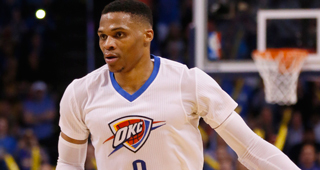While the regular season is a grueling slog that forces teams to think big picture, the NBA playoffs are a different beast. Each game becomes a chess match, where little strategic nuances can be the difference between success and failure. In these previews, we’ll take a look at one intriguing tactical quandary facing each team.
Oklahoma City Thunder
- The Ryan Anderson pass and follow
A big part of Houston’s success this season has been the 3-point bombing of Anderson. Whether he’s been spacing the floor on the weakside or involved in some sort of screening action, he’s constantly putting pressure on opposing defenses. At 40.3 percent from beyond the arc, the Thunder need to make sure Anderson doesn’t get loose for those high value shots.
One particularly tricky area to track Anderson is in situations within the flow of normal offense where he receives a kickout and decides to continue the reversal by passing to a teammate coming up out of the corner and following that pass with a screen. Any pick-and-pop on the “empty” (meaning no help defenders on the same side) side of the floor is a monster to defend with a shooter like Anderson -- just think of the headaches similar 3-point aces like Dirk Nowitzki have caused.
The difference between Anderson and some other stretch bigs, however, is that Anderson has something of a fatal flaw in his game -- he struggles to exploit mismatches from switches in post ups. Anderson only had 46 attempts, but he ranked in the bottom quarter of the league in post ups this season, per Synergy’s database. And a lot of those post ups came off switches in that exact pass-and-follow situation:
Oklahoma City needs to do everything they can to avoid Anderson simply being allowed to rain 3’s. In these situations in particular, it should be an automatic switch for the Thunder, almost baiting the Rockets to throw the ball into Anderson for a low percentage return. Consider the length and/or strength of their wing defenders, OKC shouldn’t have any issues with Anderson simply bullying specific switches to the rim.
In general, switching (although they need to be careful when James Harden is involved) needs to be the almost default tactic against Anderson in this series. Anything the Thunder can do to limit his 3-point attempts will give them a greater chance to emerge victorious from this matchup.
Houston Rockets
- Keeping Russell Westbrook busy on defense
Given the presence of Victor Oladipo and Andre Roberson, there’s a good chance Westbrook finds himself spending a good chunk of this series matched up on the least threatening Houston perimeter player (likely Trevor Ariza). But given the rotation maneuvering that goes on, Westbrook may find himself on Eric Gordon for stretches.
Because he handles such a heavy load on offense, the Rockets must make sure to run plays at Westbrook as often as they can when the matchup is in their favor. Specifically, when Gordon is on him, the Rockets can run some of their off-ball screening action in an attempt to make Westbrook expend some energy on the defensive end of the floor. Though Gordon comes off a myriad of screens, the two most common are basically a wide pin down….
….and a double stagger up from the corner:
While it’s always dicey to take the ball out of James Harden’s hands (when he’s on the floor at the same time as Gordon that is), the Rockets get a pretty decent on Gordon’s off-screen plays. And even if it doesn’t produce the same effectiveness as a Harden pick-and-roll, it’s hard to calculate how much is gained by putting Westbrook to work on defense.
For all the power of analytics, there isn’t a good way to measure how much energy a player expands in game and, in turn, what effect that has on his performance. But conventional wisdom says that Westbrook chasing Gordon around screens has a better chance of sapping his energy than letting him just sit in a help position while Harden does his pick-and-roll dance.
If Houston wants to ensure they win this series, they need to find everything in they can in their approach to limit Westbrook’s effectiveness on offense. In this series, part of that plan might be making him defend.



